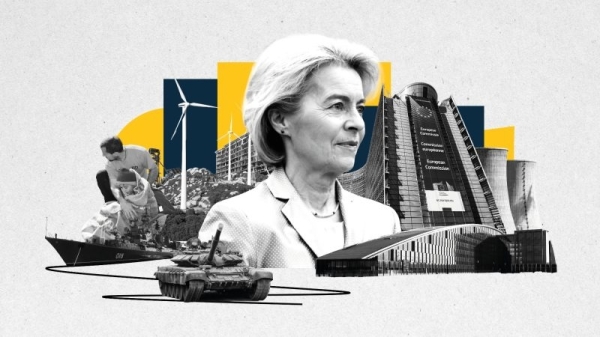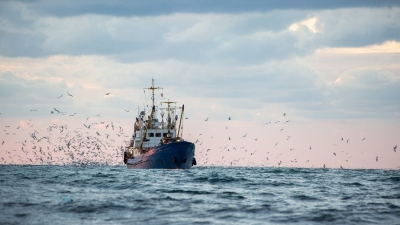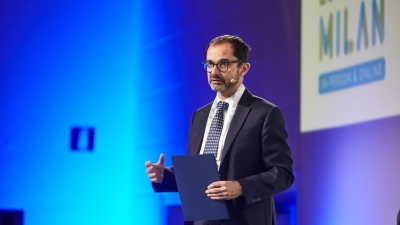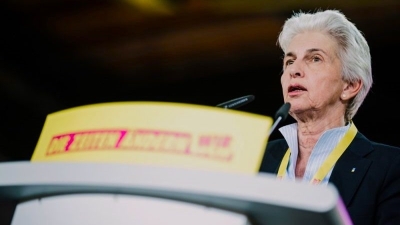Von der Leyen’s mammoth task: Make the centre hold

As European Commission President Ursula von der Leyen launches her bid for a second five-year term, she faces a balancing act of keeping EU unity and the far-right at bay.
Ending months of speculation, von der Leyen told members of her conservative CDU party in Germany on Monday (19 February) that she was seeking a second term.
“We must defend against divisions from within and from outside. I am sure that we have the strength to do so, and that is the task that I have set for myself,” von der Leyen said in Berlin, vowing to defend the bloc from forces aiming to divide it.
Her candidacy will be rubber-stamped by the conservative European People’s Party (EPP), the CDU’s political home, at its meeting in Bucharest next month.
By officially throwing her hat in the ring, von der Leyen immediately becomes the frontrunner, as her centre-right party is forecast to win the most seats in June’s EU elections, after which the biggest party gets the right to nominate the next Commission president.
A ‘safe bet’, but no done deal
To be re-elected to the helm of the EU’s executive, von der Leyen will have to gain support from as many EU leaders as possible, across political fault lines.
Except for Hungary’s Prime Minister Viktor Orbán, no significant opposition is expected from the EU 27 leaders.
Some have already endorsed her for a second term, and almost all the others either like her, respect her or count on her skills to bring things over the finish line, especially in times of crisis.
Finland’s Prime Minister Petteri Orpo and Sweden’s Ulf Kristersson, have already said they would back her candidacy. Even progressive politicians, like the Spanish Prime Minister Pedro Sánchez, have signalled their willingness to support a second von der Leyen term.
The challenge will be to keep most of the bloc’s leaders satisfied over the next few months as they will be certain to put down requests to make sure their interests – and key players – are represented in the next term.
Von der Leyen, a protégé of former German Chancellor Angela Merkel who has served as minister in all four of her cabinets, is the first woman to lead the Commission.
In some ways, her second-term bid resembles Merkel’s ‘you know me’-approach.
In other words, we trust each other and have solved crises together – why change a winning team?
However, von der Leyen’s assertive governing style – often frowned upon by those working inside the Berlaymont – created tensions with some EU leaders, some of whom worry about over-reach by an ambitious executive.
In many ways, von der Leyen was the compromise candidate few thought much of when first elected in 2019.
Still, throughout her first mandate, she drastically expanded the EU’s power and ambition over the past four years.
The legacy of her first term is a more robust agenda, shaped by the COVID-19 pandemic, the formal exit of Britain from the bloc, a new war in Europe — and the unprecedented political unity to back Ukraine so far.
Under her leadership, the EU has embarked on major transitions: toward a green and digital economy, rethinking the bloc’s security and defence, and beefing up its economic security.
Many of those tasks would have been previously unthinkable, from jointly procuring vaccines on a large scale to breaking the taboo of financing arms delivery.
‘Make the centre hold’
With Europe at this specific turning point, perhaps the most important in the last 50 years, the hard-won new unity could face a backlash amid fears of a continued rise of the far right in Europe.
With the changed political landscape, a second term would be a sign of stability, all the more needed when core European values are being questioned inside and outside the bloc.
It will be something EU leaders will have in mind, but the more difficult part could be the new European Parliament.
Von der Leyen will have to secure the support of the majority of lawmakers in the new Parliament to get the final go-ahead for her second term.
The latest polls suggest that extreme-right, anti-immigrant parties across Europe will grab more seats in European Parliament elections on 6-9 June, pushing the legislature to the right.
It could also grow the cohort of European lawmakers sympathetic to former US President Donald Trump, should he regain the White House later in November and cause a fresh headache for Europe with his ‘America-first’ approach.
Von der Leyen’s main challenge after the re-election will be to make sure that the centre holds. keeping the EU’s 27 member states together as the bloc continues into a period of geopolitical uncertainty.
It is unlikely she will be able to count on Viktor Orbán, too much china has been shattered between the Berlaymont’s 13th floor and Budapest during her term.
Orbán, whose government has been trying to unblock billions of euros in EU funds suspended by Brussels over Fidesz’s policies, recently said Hungary “must say no to the current Europe model built in Brussels”.
Her relationship with Italy’s Prime Minister Giorgia Meloni could be key.
With her strong anti-immigration rhetoric, Meloni has become an unlikely power player inside the bloc, one that has disproved critics fearing a far-right government in the EU’s third-biggest economy.
Be it Lampedusa, the northeastern city of Forlì after disastrous flooding, or Rome for the launch of a new development plan for Africa – von der Leyen has invested significant time wooing Italy.
The trips have provided an opportunity for von der Leyen to develop her relationship with Meloni, who turned from a staunch EU opponent to a moderate conservative.
The latest election projections show a major surge of right-wing parties in the EU, and von der Leyen sees Meloni as a solid ally in her bid for re-election, with her party, Fratelli d’Italia, a powerful member of the right-wing European Conservatives and Reformists (ECR).
Meloni could encourage her allies to move from shouting Eurosceptic slogans to implementing right-wing policies across the bloc.
War economy mode
Von der Leyen would begin a second term at a time when Europe is focused on how to strengthen its security in the face of Russia waging a war dangerously close to its borders.
Responding to Russia’s invasion of Ukraine has put EU diplomacy on decision-making steroids. The bloc’s swift response and continued unity are probably her strongest legacy.
While pundits widely expected fatigue, and associated costs, to cloud the support to Ukraine, European commitment to Kyiv has so far not wavered.
But member states are increasingly conscious of the massive burden Ukraine’s accession – and the candidacies of other countries, including those in the Western Balkans – would pose to the bloc.
It could change the EU beyond recognition, with the need for far-reaching reforms of EU decision-making and budget policy.
The challenge of explaining the realities to European citizens and national governments could be a major challenge for her next term.
Should it coincide with a return of Trump, who has rattled NATO allies by threatening to abandon those who fail to meet their defence spending commitments, von der Leyen will need to make good on the pledge to build a “strong Europe”.
Especially as the bloc is slowly but steadily moving towards a ‘war economy ‘ rationale of ‘spend more, spend better, spend European’.
The bloc will have to boost its defence resources – improving spending on defence production and ensuring that the manufacturing is done in Europe so that billions in taxpayers’ funds are channelled to companies that are creating jobs on the continent.
Strengthening (defence production) capacities, autonomy and community preference are three subjects supported by French President Emmanuel Macron.
Von der Leyen also outlined plans to “install a commissioner for defence” if she won a new term.
“And where he or she is coming from — this is open but of course, I think it’s very important for the Central and Eastern European countries to have good portfolios, and this is a good portfolio,” she told the Munich Security Conference this weekend.
It was seen as a smart move, catering to those EU leaders in Central and Eastern Europe who might not be fully persuaded of her commitment to those parts of Europe yet.
Balancing (green) legacy
Under von der Leyen’s Commission, the European Green Deal and an ambitious if contentious carbon-reduction agenda became a project embraced by mainstream political parties.
But a far-right surge could slow the progress of the EU’s green transition that von der Leyen had made a cornerstone of her first term.
Like with migration, climate politics risks seeing a right-wing turn by centre-right parties.
In recent months, her green policies have come under fire from her own conservative family, who are seeking to slow down the Green Deal arguing that it imposes an excessive bureaucratic burden, and cost, on industry and agriculture.
A second term could see her priorities shift, with more concessions to Europe’s farmers, and the need to balance between winners and losers of the green transition.
Read more with Euractiv




